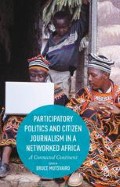Abstract
Zimbabwe is an illuminating case study that glaringly shows how radio, as a powerful medium, plays a role in the battle for the control of minds in a conflict-ridden environment. As a medium that has a significant impact on politics and power, it remains a preferred medium of hegemonic projects that are of great service to the status quo. It is effective in facilitating the ideological manipulation of the masses. This explains the interest that has been shown with regard to the control of radio by both the colonial governments and the Zimbabwean government, leading to the emergence of alternative voices from outside the country that have been offering the masses an alternative voice to that churned out by the state. These radio stations emerged during the time the state was named Rhodesia as a tool to fight against colonialism. Most interestingly, they have re-emerged after independence, their focus though, no longer being the liberation from colonial occupation, but what Moyo (2012) sees as a new form of liberation from emerging forms of oppression perpetrated by the former liberators on the people they are supposed to have liberated. This chapter therefore seeks to examine the impact of radio both in pre-and post-independent Zimbabwe, with the aim of creating an understanding of why voices are still emerging from the diaspora in a country which is a signatory to the 1991 Windhoek Declaration, which upholds freedom of expression and access to information as a constitutional and democratic right for all citizens.
Access this chapter
Tax calculation will be finalised at checkout
Purchases are for personal use only
Preview
Unable to display preview. Download preview PDF.
References
Biener, H. (2008). “Radio for peace, democracy and human rights: Zimbabwe”. http://www.evrel.ewf.uni-erlangen.de/pesc/peaceradio-ZBW.html. (Accessed 03/06/2012)
Cowell, Alan. “Ian Smith, Defiant Symbol of White Rule in Africa, Is Dead at 88.” The New York Times, November 21, 2007, International News sec. Accessed July 17, 2015. http://www.nytimes.com/2007/11/21/world/africa/21smith.html? pagewanted=all&_r=0.
Chuma, W. (2010). “Reforming the media in Zimbabwe: Critical reflection”. In Moyo, D. & Chuma, W. (eds.) 2010. Changing Southern Africa: Critical Reflections on Media Reforms in the Global Age. 1st edition. Pretoria: Unisa Press, pp. 90–107.
Curran, J. (2010). Media and Society. Bloomsbury Academics, 5th edition. London: Bloomsbury.
Hyden, G., Lesslie, M., and Ogundimu, F.F. (2007). Media and Democracy in Africa. London: Translation Publishers.
Lush, D. and Kupe, T. (2013). “Free expression and access to information in Zimbabwe”. In International Conference on Media, Johannesburg: International Media Support (IMS), The Netherlands Institute for Southern Africa (NiZA), Media Institute for Southern Africa (MISA) and the Open Society Institute. pp. 4–15.
Maja-Pearce, A. (1995). “Zimbabwe”. In Article 19 and Index on Censorship, Who Rules the Airwaves? Broadcasting in Africa, London: Article 19. p. 123.
Mano, W.(2005). “Press Freedom, Professionalism and Proprietorship: Behind the Zimbabwean Media Divide”, Westminster Papers in Communication and Culture, Special Issue, November, pp. 56–70.
Mosia, L., Riddle, C. and Zaffiro, J. (1994). From revolutionary to regime radio: Three decades of nationalist broadcasting in southern Africa. Africa Media Review 8(1): 1–23.
Moyo, D. (2005). “From Rhodesia to Zimbabwe: Change without Change?” Broadcasting Policy Reform and Political Control. In Media, Public Discourse and Political Contestation, Henning Melber (ed.), Uppsala: Nordic Africa Institute.
Moyo, D. (2009). Citizen journalism and the parallel market of information in Zimbabwe’s 2008 elections. Journalism Studies 10(4): 1–20.
Moyo, D. (2010). Reincarnating clandestine radio in post-independence Zimbabwe. Radio Journal: International Studies in Broadcast and Audio Media 8(1): 2–16.
Moyo, L. (2012). Participation, citizenship, and pirate radio as empowerment: The case of radio dialogue in Zimbabwe. International Journal of Communication (IJoC) 6(484–500): 1–17.
Ndlovu, E. (2014). The re-emergence of diasporic radio in independent Zimbabwe. Ecquid Novi: African Journalism Studies, 35(3). http://www.tandfonline.com/eprint/6KJDrJREKwQ7gXKeUzYu/full. Accessed25/07/2015.
Ndlovu, E. (2014) The Role of Diasporic Media in Facilitating Citizen Journalism and Political Awareness in Zimbabwe. Doctoral Thesis. University of Salford. Manchester. UK.
Ranger, T. (2004). Nationalist historiography, patriotic history and the history of the nation: The struggle over the past in Zimbabwe, Journal of Southern African Studies 30(2): 215–234.
Rheingold, H. (1994). The Virtual Community: Surfing the Internet. London: Minerva Publishing.
Van der Veur, P. R. (2002). Colonial Broadcasting Philosophies in British Africa, 1924–1968 [Unknown Binding].
Windrich, E. (1981). The Mass Media in the Struggle for Zimbabwe: Censorship and Propaganda under Rhodesian Front Rule. Gweru: Mambo Press.
Windrich, E. (2010). “Broadcasting in Zimbabwe”. In Media Policy in a Changing South Africa: Critical Reflections on Media Reforms in a Global Age, D. Moyo and W. Chuma (eds.), Pretoria, South Africa: UNISA. pp. 85–87
Van der Veur, P. R. (2002). Colonial Broadcasting Philosophies in British Africa, 1924–1968 [Unknown Binding].
Zaffiro, J. (1984). Broadcasting and Political Change in Zimbabwe, 1931–1984. Unpublished doctoral dissertation, University of Wisconsin-Madison.
Ziegler, D. and Asante, M. (1992). Thunder & Silence: The Mass Media in Africa. New Jersey: Africa World Press.
Editor information
Editors and Affiliations
Copyright information
© 2016 Everette Ndlovu
About this chapter
Cite this chapter
Ndlovu, E. (2016). The Positioning of Citizen-Influenced Radio in the Battle for the Control of Minds. In: Mutsvairo, B. (eds) Participatory Politics and Citizen Journalism in a Networked Africa. Palgrave Macmillan, London. https://doi.org/10.1057/9781137554505_4
Download citation
DOI: https://doi.org/10.1057/9781137554505_4
Publisher Name: Palgrave Macmillan, London
Print ISBN: 978-1-349-56835-2
Online ISBN: 978-1-137-55450-5
eBook Packages: Literature, Cultural and Media StudiesLiterature, Cultural and Media Studies (R0)

